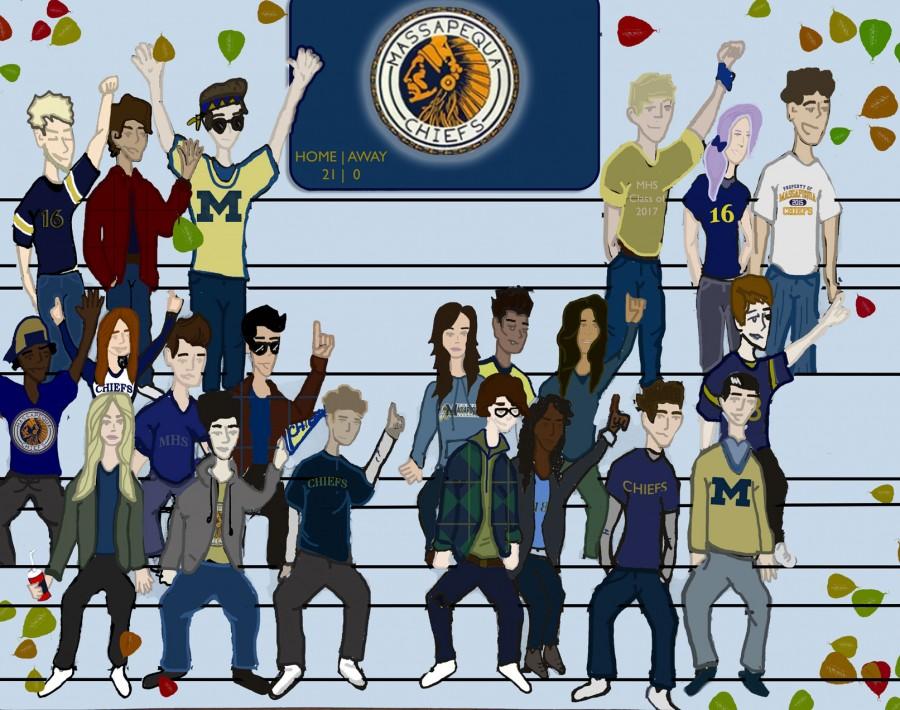EDITORIAL: The Chief: a symbol of Massapequa pride
The chief is a local symbol of pride in the town of Massapequa.
The iconic symbol of Massapequa, The Chief, has come under fire and sparked fierce debate as to whether or not the commanding emblem is derogatory towards the Native Americans. Mascot controversy has been enraging various groups and tribes as both sports teams and schools use the images of Native Americans as marketing and spirit-rallying images.
The town of Massapequa derives its name from the Native Americans who once lived in the area. Prior to European settlement, Long Island was divided into thirteen tribal territories. Those who lived in the region from Seaford to the west, Islip to the east, Huntington to the north, and the Great South Bay to the south were known as the Massapequa tribe, also known as the Marsapequa or Marsapeagues.
The culture of the Massapequa community, especially in terms of athletic achievement, is greatly impacted and aided through the use of a symbol that portrays strength, valor, and tenacity. These values were once exercised by the earliest leaders of the area, and are cherished today by current residents of Massapequa. “The Chief” mascot is a manifestation and celebration of the respect earned and deserved by chiefs throughout Long Island’s history. Perhaps Massapequa’s sports standings would not be the same without the unifying symbol that is “The Chief” mascot.
Indeed, the modern area that includes Massapequa was once a center for Native American life. According to An Illustrated History of Massapequa, in 1935, excavation efforts in what is now Harbour Green, unearthed fourteen skeletons of Native Americans, well preserved due to the South Shore’s sandy soil. Additional Native American relics were found under the Massapequa Lake, 0.8 miles away from MHS. These findings point to the once large population of Native Americans in the area.
As the saying goes, “Once a Chief, Always a Chief.” Across Long Island, each tribal territory, or “chieftaincy,” was led by a chief who presided over the territory. Thus, “The Chief” is meant to pay tribute to the once powerful leaders of Long Island, and came from a state of respect, not reproach. Thus, the mascot is a celebratory symbol of the first inhabitants of Massapequa, and represents their valiant achievements rather than their eventual decline.
Massapequa was once led by a chief who stood up for his people, even in the most despairing of situations: Tackapausha, also known as Takapoosha.
Although the Native Americans were ill-fated — as they were no match for the settlers’ weapons, as well as the diseases that they brought — Tackapausha bought the Native Americans of Massapequas more time. He, along with another chief, “Will Chippy,” skillfully transferred pockets of his tribe’s land over a period of time.
“There is something heroic in this Chief of the Massapeques. Clothed in furs, disdaining gew-gaws, and tempting finery offered by the whites, standing as a barrier against their encroachments,” early settler Daniel Denton wrote about Tackapausha in 1670, according to the Massapequa Historical Society. “And, as far as he could, holding his possessions intact until death took him to The Happy Hunting Ground.”
Massapequa wishes to pay appropriate homage to the true first explorers, discoverers, and settlers of the Americas, Native Americans, through our mascot that adorns apparel, posters, pennants, bumper stickers, and even this newspaper, “The Chief.” However, in order to this, the residents of Massapequa and Massapequa Park need to do their part in learning about the past so that they can celebrate the rich history of their town.
Recently, professional sports teams, namely the Washington Redskins, have faced criticism for choosing to keep their logos in the wake of activist opposition. The professional football team came under fire for having an offensive, racist name. In an interview with CNN, Suzan Harjo, a Native American activist who strives to ensure that Native Americans are treated with the dignity they deserve, emphasized “the R-word — she can’t even bring herself to say it—is the same as the N-word.”
Harjo insists that instead of feeling honored for having their heritage exposed in mainstream culture, Native Americans feel offended. “”They say, ‘You’re being honored’ . . . we say, ‘We’re being offended,’ ” explained Harjo. “They say honored. We say offended. Then they just tell us to shut up,” Harjo said in a statement, according to the Los Angeles Times.
A game between the Dallas Cowboys and Washington Redskins during Columbus Day Weekend in 2013 sparked additional controversy. Outrage followed as Native American tribes were offended that the day devoted to Christopher Columbus— who along with his crew, was responsible for killing through enslavement, slaughter, and disease much of the native population of islands such as Haiti—was now also the day that a team that has supposedly celebrates Native American heritage.
On a broader national scope, it is theoretically reasonable for American Indian tribes to hold greater influence in deriving solutions for these controversial issues. However, on the local level, it is unlikely that the mascot will ever be changed.
Massapequa is overwhelmingly lacking in a Native American population— this could be a reason why there haven’t been any active movements to change the mascot of “The Chief.” According to the 2010 census, out of 21, 685 residents, only eleven held Native American heritage.
“I am not a fan of organized sports and that’s primarily what the logo [“The Chief”] is used for,” Massapequa High School senior Aggie Lesser said. “..I think people should learn more about what that symbol means before they put on their jerseys or cheer for their school.”
There are several resources are available to the public for this very reason. The Massapequa Historical Society has access to archives that date back to early settlement of the area. In addition, books are available in the Massapequa Public Library: for example, An Illustrated History of Massapequa by the Massapequa Post and The Long Island Indian by Robert Coles.
Ultimately, we seek to honor the original native people of the continent that we too call home. Massapequa began as land of a Native American tribe and though it is not in Native American possession any longer- we must do our part to honor the original people of the region. Though we cannot rewrite history and prevent the erosion of Native American presence, it is our duty, as a town, to pay homage to our valiant predecessors.





